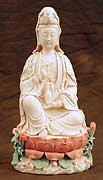
All that a man achieves and all that he fails to achieve is the direct result
of his own thoughts. In a justly ordered universe, where loss of equipoise would
mean total destruction, individual responsibility must be absolute. A man's
weakness and strength, purity and impurity, are his own, and not another man's;
they are brought about by himself, and not by another; and they can only be
altered by himself, never by another. His condition is also his own, and not
another man's. His suffering and his happiness are evolved from within. As he
thinks, so he is; as he continues to think, so he remains.
A man becomes calm in the measure that he understands himself as a thought-evolved
being, for such knowledge necessitates the understanding of others as the result
of thought, and as he develops a right understanding, and sees more and more
clearly the internal relations of things by the action of cause and effect,
he ceases to fuss and fume and worry and grieve, and remains poised, steadfast,
serene.
A man can only rise, conquer, and achieve by lifting up his thoughts. he can
only remain weak, and abject, and miserable by refusing to lift up his thoughts.
Before a man can achieve anything, even in worldly things, he must lift his
thoughts above slavish animal indulgence. He may not, in order to succeed, give
up all animality and selfishness, by any means; but a portion of it must, at
least, be sacrificed. A man whose first thought is bestial indulgence could
neither think clearly nor plan methodically; he could not find and develop his
latent resources, and would fail in any undertaking. Not having commenced manfully
to control his thoughts, he is not in a position to control affairs and to adopt
serious responsibilities. He is not fit to act independently and stand alone.
But he is limited only by the thoughts which he chooses.
A man may rise to high success in the world, and even to loftly altitudes in
the spiritual realm, and again
descend into weakness and wretchedness by allowing arrogant, selfish, and corrupt
thoughts to take
possession of him.
A man should conceive of a legitimate purpose in his heart, and set out to accomplish
it. He should make this purpose the centralizing point of his thoughts. It may
take the form of a spiritual ideal, or it may be a worldly object, according
to nature at the time being; but whichever it is, he should steadily focus his
thought forces upon the object which he has set before him. He should make this
purpose his supreme duty, and should devote himself to its attainment, not allowing
his thoughts to wander away into ephemeral fancies, longings, and imaginings.
This is the royal road to self-control and true concentration of thought. Even
if he fails again and again to accomplish his purpose (as he necessarily must
until weakness is overcome), the strength of character gained will be the measure
of his true success, and this will form a new starting point for future power
and triumph.
A man only begins to be a man when he ceases to whine and revile, and commences
to search for the hidden justice which regulates his life. and as he adapts
his mind to that regulating factor, he ceases to accuse others as the cause
of his condition, and builds himself up in strong and noble thoughts, ceases
to kick against circumstances, but begins to use them as aids to his more rapid
progress, and as a means of discovering the hidden powers and possibilities
within himself.
As the physically weak man can make himself strong by careful and patient training,
so the man of weak thoughts can make them strong by exercising himself in right
thinking.
A strong man cannot help a weaker unless that weaker is willing to be helped,
and even then the weak man must become strong of himself; he must, by his own
efforts, develop the strength which he admires in another. none but himself
can alter his condition.